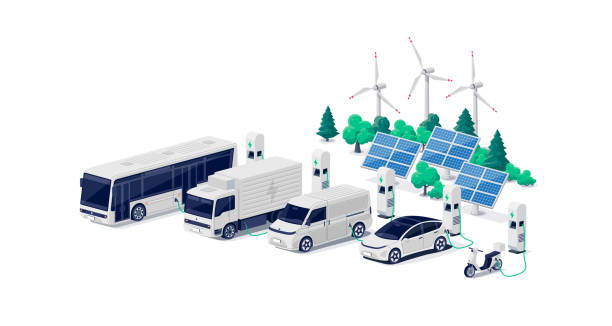
Electric vehicles (EVs), which are environmentally and economically friendly, are becoming more popular in America and all over the globe. Manufacturers are now offering plug-in EV models to their fleets.
You may be interested in buying an EV or already own one.
There are fewer public charging stations than traditional gas stations. It is normal to want to purchase a port that is easily accessible for your home. It is convenient and sometimes even necessary.
Many home charging points get their energy from the electricity grid. It is possible and more sustainable to generate energy from solar panels. Solar panels can be attached to your home EV charging port to save you money, as some EVs need a lot of power to fully charge.
We’ll be looking at the different EV batteries (and EV sizes) and how efficiency of your solar panels can determine how many panels you will need to charge your EV.
HOW BIG IS YOUR EV BATTERY SIZE?
Before you can determine the capacity of your EV battery, you must first know how much electricity it will need. EV battery capacities are measured in kilowatt-hours (kWh) and range from 17.6kWh to 200kWh.
These are the five electric vehicles with the largest battery capacities as of 2021.
- GMC Hummer Electric Vehicle: 200-kWh Battery with 329 to 352 miles range
- Rivian HTML1T/R1S:135kWh battery with 314 and 316 miles respectively for the R1T, and 316 for the R1S
- Lucid Air -118kWh battery with 520 mile range
- Mercedes-Benz EQS – 115-kWh lithium-ion battery with 350-mile range
- Tesla Model S & Model X: 100 kWh battery with 387 to 520 mile range for Model S, and 335 to 371 miles range for Model X
If you need help determining the capacity of your current EV battery or the one you wish to buy, ask your dealer. Once you have the capacity of your EV battery, you can calculate how much electricity it will require to charge.
Your solar panel size and efficiency will determine how many panels are needed to produce enough energy to charge your EV batteries.
DOES SOLAR PANEL EFFICIENCY MAKE A DIFFERENCE?
Many factors affect the number of solar panels needed to power your EV and your home.
- Choose the manufacturer and type you want for your solar panels
- What is the amount of sunlight in your area?
- Your home and your driving energy consumption
You won’t need to have as many solar panels to provide your energy needs. Some panels are more efficient than others. SunPower’s solar panels have the highest efficiency on the market. The panels from the A-Series are 22.80% efficient.
These are the top companies that offer the best residential solar panel:
- SunPower
- LG Solar
- REC Group
- Panasonic
- Silfab
- Q Cells
- Canadian Solar
- JinkoSolar
- Trina Solar
HOW MANY SOLAR PANELS ARE YOU REQUIRED TO CHARGE YOUR EV’S PHONE?
A typical solar panel produces between 30 kWh and 42.5 kWh per month. It is typically 250 watts. You’ll generate about 1 kWh per day at the lower end. If the Tesla Model S starts at 0%, this means that you would need 75 solar panels to charge it to 100%.
Your EV will likely not drop to 0% every charge, so this is a conservative estimate.
You could generate 54 kWh per month or 1.8 kWh each day if you use high-efficiency SunPower panels. They can be rated up at 420 watts. This means that you would only need 42 panels.
The average driving distance for a driver in is 39 miles per hour . This equals approximately 12 kWh of electricity. You will need 12 standard-efficiency panels to charge your devices.
If you drive less than on average 39 miles per hour, and have more efficient solar panels than you do, you will need less than 12 panels to charge your EVs. Investing in efficient, high-quality solar panels in the long term is better.
The average U.S. house requires between 19 to 34 solar panels in order to fully pay its electric bills. This number should increase if you add an electric vehicle to charge.
CONTACT FREEDOMSOLAR TO POWER YOUR EV w/ SOLAR ENERGY
The explosion of electric vehicles (EVs) is a trend that has no signs of slowing down. We will see more EVs in the future, thanks to better access to renewable energy sources and increased awareness about the benefits of sustainable living.
Adding solar power to your EV battery source is a great way to live green.
